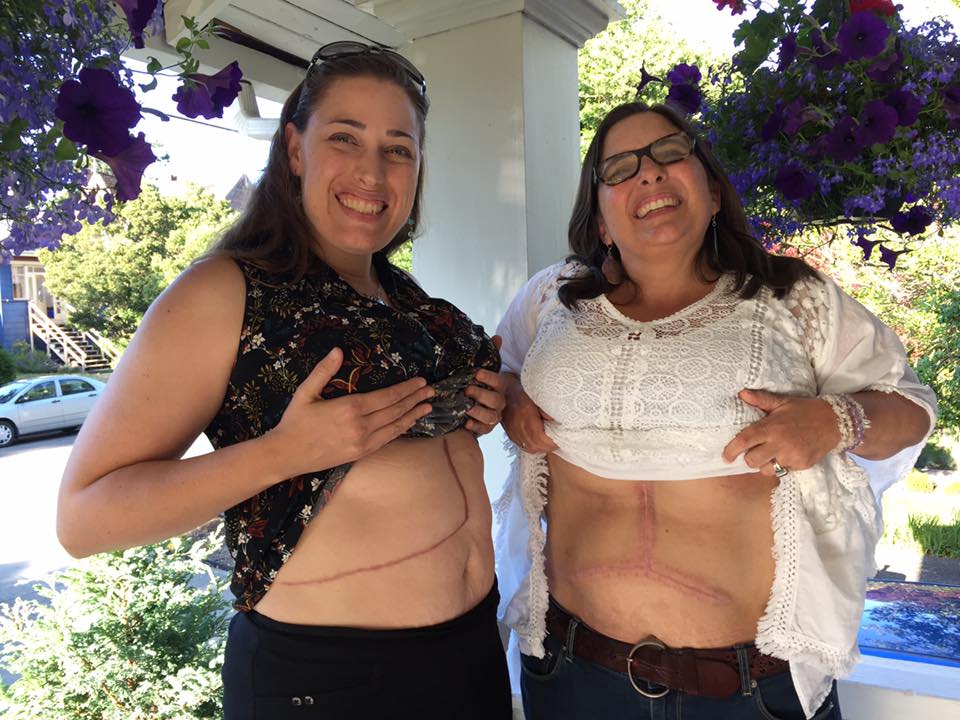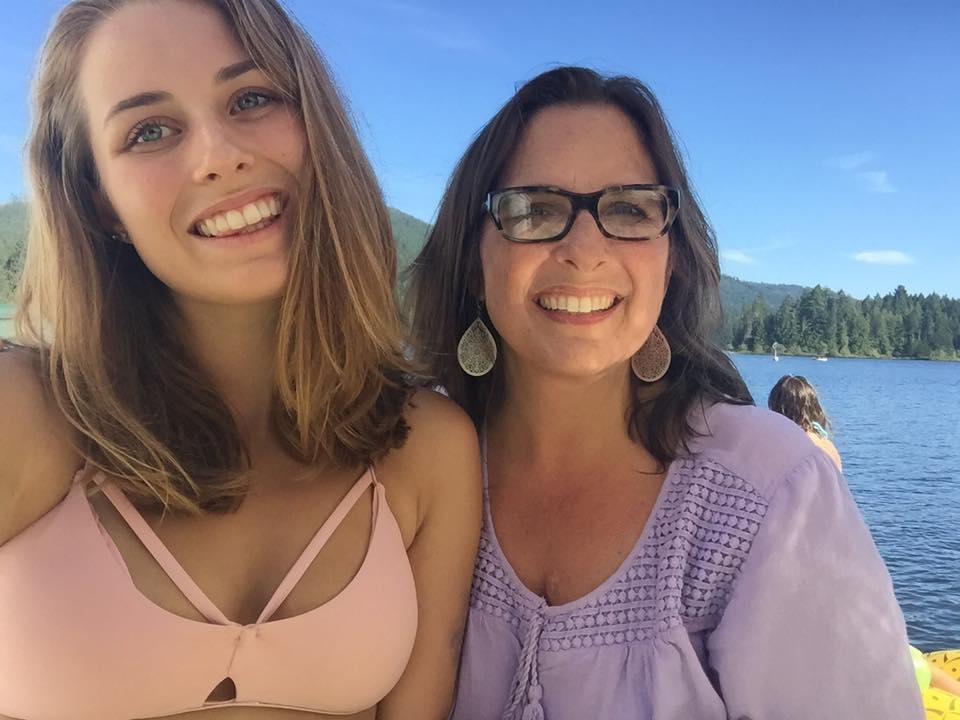I wrote this blog post to honour PSC Awareness week. This is my PSC & liver transplant story (so far). I hope sharing it will give other people hope and raise awareness for this rare disease. If you're mainly here for the francophile stuff you may want to skip this one. It is proof that life can get messy at times, but that sometimes those are the most revelatory times of all.
*********
I'm not a big believer in the theory that thoughts manifest a person's reality. The main reason for this is that I never heard of PSC - the disease that completely turned my life on its head five and a half years ago - before I was diagnosed with it.
It was absurd.
My husband and I had applied for extended disability insurance because we'd made an international move from France to Canada, had a third daughter, and were feeling incredibly healthy. We were juicing our own garden-grown kale and running 10K races.
A nurse employed by the insurance company came to weigh us, take our blood and all that jazz. The thought that anything could be wrong with my liver never even entered my mind.
Yet something was wrong. Something seriously wrong.
A woman from the insurance company called me back. "You're being turned down for your insurance request. You need to make an appointment with your doctor as soon as possible."
I started imaging all sorts of horrible scenarios, but not once did I consider my liver.
Cut to many appointments, many tubes of blood taken out of my arm, an MRI, and finally a liver biopsy (just about as fun as it sounds) later. On May 1, 2012 I sat down at my GI's office and he gently said to me, "it looks like you have PSC."
PSC had been mentioned as one of the outliers they might find in my biospy results, but everyone doubted it - it was so rare and I was female. PSC usually affected men (although now I wonder about this as I know so many fellow women PSCers).
But there it was. PSC. And PSC that had been percolating for a long time according to the MRI results.
"Is there a cure?" I asked my doctor.
"No."
"What's the treatment?" I said.
"Unfortunately there is no treatment right now. The only 'treatment' if you can call it that, is a liver transplant."
I sat there, stunned. No cure? No treatment? My world pivoted on its axis in that split-second. I had no idea how to cope in this newly altered reality.
The next five years were filled with so many moments of terror, hope, despair, relief, revelations, pain, and tenacity, that they deserve a book all to themselves. They will get one too, as I'm an author and writing is how I process big events in my life.
Á few things though...
So many people said to me "I couldn't cope with something like that."
Yes. You could and you would. The secret, as I learned myself, is there is no off-ramp when dealing with this kind of life crisis. You just have to live with your altered reality. And you will. There is no other choice.
For people who tell you that your illness and suffering are all part of God's plan or part of your journey...it is completely normal that you want to punch them, even if they mean well.
I concluded that, for me, even I do not believe life-changing events, such as my PSC diagnosis, have inherent meaning (i.e. that they were destined to be) it was up to me to give them meaning.
Also, as an aside, I highly recommend Viktor Frankl's book "Man's Search For Meaning" to every human, not just every PSCer.
All my life I wanted to write and be an author. I was always held back by the typical things - fear of failure and rejection, fearing it was too indulgent to spend my time doing something so impractical, fear, fear, fear...
However, the morning after I was diagnosed with PSC (so on May 2, 2012) I woke up, walked downstairs, and flipped open my laptop. There was a pad of post-its notes beside my computer and on one of them I scribbled "F--- you! I'm not dead yet." and I began writing.
All of a sudden the fear of dying with my words still inside me became far scarier than being rejected because people didn't like what I wrote.
About ten months later I published my first book, My Grape Escape, and it became a bestseller. I decided I would donate 10% of my after-tax royalties to PSC Partners for the incredible work they do. I wanted every word on the page not only to be the expression of my lifelong dream, but also to be raising money for this phenomenal organization. There is was...meaning.
So many irrational fears melted away in the face of my PSC - flying, elevators, failure, and what people thought of me, just to name a few.
My focus shifted to spending time with my three daughters and my husband, enjoying my friends and family, going outside to watch sunsets or savour the smell of a fresh mug of coffee and, of course, writing as much as I possibly could and sharing what I'd written.
Money didn't matter nearly as much as I believed it did before my diagnosis. I couldn't care less about the image I projected. I embraced who I truly was - a Star Wars geek, a francophile, a bookworm, an over-thinker, a hippy lover of crystals and magic. Life was just too precarious and short, I realized, to try to be anything but myself.
This clarity is one of the gifts that PSC gave me.
The past five years have been hard. At times they felt almost impossible. With the help of PSC Partners I had to fight to find the best possible care for my PSC. As it turned out this was in a different province.
I passed out on the street from cholangitis induced sepsis in 2013, and since then had to have a constant rotation of oral and IV antibiotics to control the infection which had settled in my bile ducts and liver. I spent way too much time in the hospital.
There were weeks I suffered from so much pain and nausea I could barely get off the couch.
One morning I came downstairs and my darling husband informed me I was so yellow I looked like a Star Trek extra. There were so many times when I thought I could not go one hour, one minute, one second more. But I did. PSC taught me that my well of tenacity was far deeper than I ever imaged.
Even though I feel incredible gratitude to the universal healthcare in Canada that covered every dime of my care, tests, and eventual transplant, I still had to fight to get one.
As all of us PSCers know, not all of us are lucky enough to remain healthy enough to qualify for a transplant, or to be considered sick enough to warrant one. It's a tricky balancing act, and even though I felt so ill, I had to advocate for myself every step of the way.
I was so glad that I had fought previously to assemble a wonderful care team around me - my GI in Victoria, my PSC specialist in Calgary, and the Edmonton Transplant Centre. PSC Partners and my fellow PSCers were instrumental in guiding me through this process.
The doctors were honest with me, often brutally so.
A specialist told me at my first appointment with him, "You'll be dead before you'll ever qualify for a deceased organ Laura. With the type of PSC you have and your constant cholangitis and sepsis your labwork will never show how sick you truly are. You need to start working now at finding a living donor."
Here comes the most important lesson that PSC taught me.
After spinning my DNA my specialist believed that my type of PSC was largely genetic in origin. Indeed, my father's first cousin also has PSC / UC like I did. For this reason my doc did not want anyone who shared DNA with me to donate. This eliminated blood relatives (usually the most common donor category). My husband and brother in laws were all the wrong blood type.
I had to appeal to friends to donate 60-70% of their liver to save my life. This, as you can imagine, is no simple thing. At least that's what I thought.
First, one of my oldest and best friends from school came forward, even though we had been living in different cities for years. His commitment and determination to be my donor changed my heart forever. I honestly didn't know if I would react like him if the roles were reversed. All I could do was watch in amazement as he fought to put his life on the line and undergo major surgery for me.
Ultimately this dear friend was told at the last minute he had a tiny extra bile duct that would increase complications for me. We were both devastated. I wondered how many other people like him could possibly be out there? Probably not many.
I was wrong.
Next another friend went through the inconvenient and at times intimidating approval process. Ultimately her husband, who was suffering some unresolved trauma of his own, asked her to back out. She agreed reluctantly and I understood completely, but the fact she was willing to go through all of that for me touched me deeply.
When donor #2 fell through Nyssa came forward. She was a mother of two and we'd become friends when she had been my daughter's Sparks leader. We shared ties to the same Gulf Island and the same caustic sense of humour. Her desire to donate was equally unshakable. She was assessed in March.
On March 15th, the last day of her assessment, the phone rang.
"Hey, it's me," she said. "I just wanted to know, do you have any plans for next Wednesday?"
"I don't think so," I said, confused.
"Oh good. Then can you meet me in Edmonton and I'll give you the right lobe of my liver?"
Much screaming ensued and much rushing around was required to get ready to fly to Edmonton four days later.
I'll never forget how, even though she was scared, Nyssa never wavered. I was waiting in the holding pen of the OR's after having said good-bye to Franck and all I could think was, "Where's Nyssa? I need to see Nyssa before we're rolled in."
Just then they rolled her stretcher beside mine. We both were wearing our ridiculous surgical hair caps and had both been hooked up to IVs. She was crying. I was crying. I reached over and grasped her hand. "You don't have to do this if you don't want. I understand."
She sniffed. "I'm terrified," she admitted. "But we're doing this. We are going to ROCK this."
We squeezed each other's hands, giving each other strength, and cried at the enormity of what we were about to go through. Finally a transplant fellow came over to us and said to me gently, "You're going to have to let go of Nyssa's hand now Laura. We have to take you to your OR."
"But where is Nyssa going?"
"She's going to the OR right beside yours in just a minute. You'll be side by side."
Nyssa let go of my hand. "We're going to do this Laura. We're doing this."
"Thank you," I kept shouting to her as they rolled me away. "No matter what happens thankyouthankyouthankyouthankyou."
Turns out Nyssa donated her entire right liver lobe to me, which was attached to my body with donated vessels from an anonymous deceased donor. I also received five pints of donated blood to keep me alive during the surgery. When I think of the number of people who donated their time, skill, and body parts so that I am here today I am truly humbled - and not just in the cliché way.
It's almost six months now since we had our transplant. Nyssa did amazingly well like the superhero she is and was back home in Victoria in just after two weeks.
Post - tx rejection. Turns out our antibodies needed some thymo and steroids to play nicely together.
I had an initial bout of acute rejection (because as it turns out strong women have strong antibodies that don't always play nicely together) but since then have been recovering in leaps and bounds.
I know complications can arise and I know the PSC can come back, but I'm choosing to live like they won't. I'm not going to waste one single day of renewed health.
Living with PSC was brutal sometimes. More than anything I want people newly diagnosed to hear from their doctor, "You have PSC, but there are effective treatments." Better yet, I'd like them to hear, "You have PSC, but we have a cure for that."
All PSCers need to sign up for the registry. It is our best method of getting life-saving research done quickly and efficiently. It is crucial that every single one of us is on there, no matter what stage of the disease we are at.
Use the PSC Facebook forums. They have proven an invaluable support group for me. These people have become my family and have helped me every step of the way.
Go to a PSC Partners Conference if you can. This is where I actually met that family, learned tons of information, and found exactly how to find the best people for my medical team. I cannot tell you what a relief it is to be in a room full of people who just "get it" - no explanations required.
Find ways to donate to PSC Partners and encouraged people who love you to help too. This is how we are going to find treatments and a cure.
And even though I hate you PSC, I thank you for:
1. Emboldening me to realize my dream of being a writer (almost ready to publish Book #5).
2. Opening up my eyes to the fact that loving hard and being loved is really the only thing that counts in the end.
3. Making spending time with my family and friends a priority. As I always say, "Even on the crappiest days, being around to parent my kids is ultimately a good day."
4. Giving me a new family in my fellow PSCers. I cannot express how much I admire and love these people.
5. Teaching me that humans are capable of being braver and more selfless than anything I ever thought possible
6. Showing me that superheros live among us
7. Showing me that we are all in this life together, and we are put here to support and help each other
8. Teaching me that there is no such thing as us and them. There is only us.
PSC was the grit in the oyster of my life. I'm realizing now, though, that the PSC grit keeps supplying me with pearls. So, PSC, even though one of my life's missions is to obliterate you forever, I do owe you thanks for that.
Me and my own personal wonderwoman rocking our scars.
My and my eldest up at the Lake this summer, enjoying family time.












